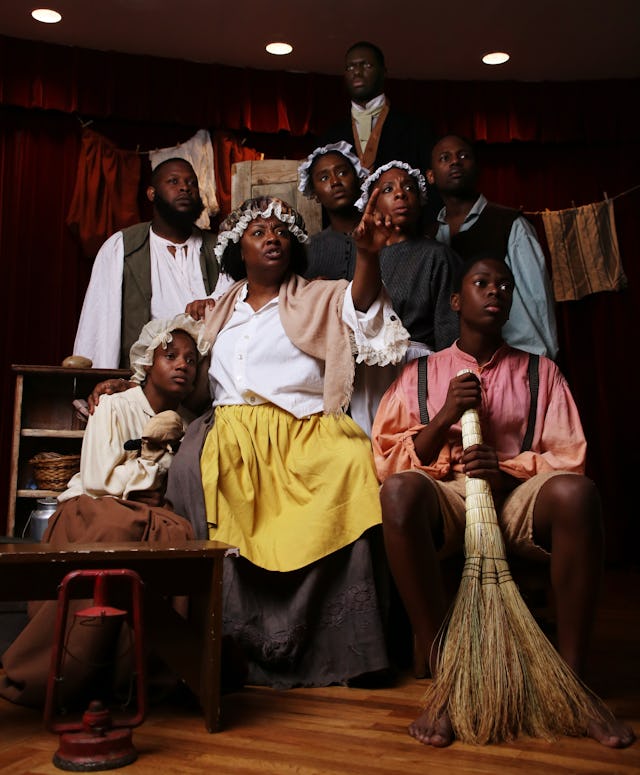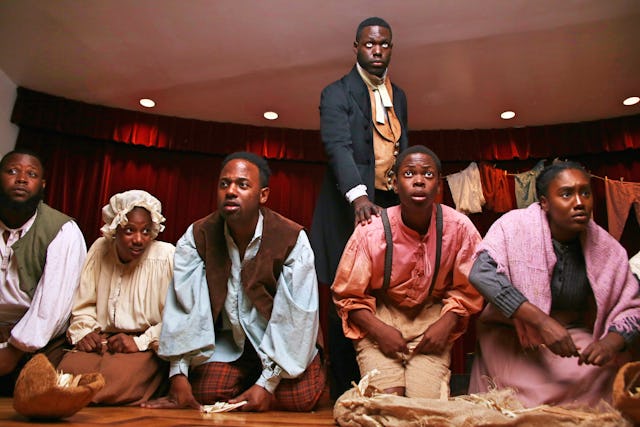Musical about escaping slavery raises consciousness, inspires conversation and action
EDINBURGH, Scotland — Determined to break free from the shackles of slavery, Henry Brown undertook a dangerous journey. The year was 1849, and he was one of the 3 million enslaved people living in the United States. He shipped himself in a wooden crate from a plantation in the southern state of Virginia to the northern city of Philadelphia. Slavery was already outlawed there, and a group of abolitionists received him, helping secure his liberation.
History would remember him as Henry “Box” Brown.
This month, his extraordinary story has been vividly brought to life at Edinburgh’s world-famous Fringe Festival. A new stage musical, Henry Box Brown, is thrilling and challenging audiences during a 21-day run at the city’s prestigious Assembly Rooms.
IN DEPTH: Listen to the creative team behind Henry Box Brown
In this edition of the Baha'i World News Service podcast, we hear from the creative team behind the new stage musical Henry Box Brown. The performance is creating an experience that stimulates constructive conversation and inspires action and social change.
Subscribe to the BWNS podcast for additional audio content.
RSS | Spotify | Apple Podcasts | SoundCloud | Tunein | iHeart | Stitcher
The show’s creator, Mehr Mansuri, a Baha’i, wanted to take on the subject of racial inequality. In view of the cardinal Baha’i principles of the oneness of humankind and the elimination of all forms of prejudice, the subject of racial equality has been dear to Ms. Mansuri’s heart. Drawing on the arts as a powerful medium for raising consciousness, she and her colleagues have created an experience that stimulates constructive conversation and inspires action and social change.
“I was searching for a story for a musical that would touch on a hero in American history from African descent,” says Ms. Mansuri — who with her family escaped persecution as a child for being a Baha’i in her native Iran. Settled in New York, she has been taking theater into public schools for two decades.
Ms. Mansuri was at a book fair with her nephew when she first came across the story of Henry Brown in a children’s picture book. It immediately struck a chord with her.
“The wounds are so deep, and we often feel so inadequate to open wounds we can’t close,” she says. “It’s really difficult and painful to conduct any discourse on the subject of race and not feel ill-equipped to do it.”
The show’s director, Ben Harney, describes how he was attracted to the story.
“The piece was very intriguing to me,” Mr. Harney, a Tony Award-winning actor, explains. “It’s an amazing story of vision, heroism, boldness, courage, and audacity. And the backdrop is a very merciless and unfriendly set of circumstances, and the cost is high.... I really was touched, moved, and inspired by the piece.”
In 1848, after his children and pregnant wife were sold to new owners in North Carolina, Henry Brown resolved to escape slavery no matter the brutal punishment he might receive or the other risks of the journey. With the help of a white clergyman and a slave-owning gambler, Henry Brown was packed into a box — 3 feet long, 2 feet 8 inches deep, and 2 feet wide — and had himself shipped 300 miles to freedom by boat and train.
While Henry Brown is the show’s protagonist, he is not its only hero. The musical invites the audience to think about the nature of real change — how it is brought about by the courageous actions of numerous individuals, like the ones in the story. It seeks to engage audience members and encourage them to see themselves also as protagonists of meaningful change for the betterment of the world around them. After a performance, audience members are given an opportunity to discuss the themes in the musical, and each is asked to make a personal pledge of action. “Then we send their pledges back to them in four months and invite them back, so hopefully the theater becomes a kind of village that comes together again,” says Ms. Mansuri.
One of the show’s cast, Najee Brown, has noticed audience members taking these conversations and pledges to heart.
“I know 100 percent that people are walking away feeling like they learned something, and that’s probably the most important part,” Najee Brown says. “How do I apply what I just saw to my everyday life? How do I make a difference after watching this?”
The impact of Henry Box Brown is heightened by the rich musical selections that run throughout it. Its musical score revives a number of 19th-century spirituals.
“All these songs have come from oppression, from forgiveness of the oppressors, songs that distracted you from the brutality of the life that you were in,” says Jack Lenz, the show’s musical director and co-composer and a Baha’i.
“All of these songs are connected to God, which is really what music is for, why we have it. It has always been connected with the worship of God and universality of sentiment and feelings, the recognition of what it is to have this sustaining power in your life, and especially if you lived through slavery.”
“How do I apply what I just saw to my everyday life? How do I make a difference after watching this?”
—Najee Brown
The musical brings together 16 performers — including world-class gospel and R&B singers from New York’s Christian Cultural Center, and leading Off-Broadway performers — who have become keenly aware of the resonance the show has for modern audiences.
“It’s very timely, and that’s both wonderful and kind of unfortunate, in that it has elements of a story that seem to click so consistently with things that are coming out in our world today,” reflects Mr. Harney. “The story of this man who was subjugated and yet who was literate ... who ultimately got to the point where it was too much. I mean, what an amazing idea. I’ll mail myself!”
Najee Brown says that “the conversations get really heavy, and sometimes I have to take a step back.”
“You’re tackling a lot of heavy subjects about what they say — you know, racism, unity — and I learned a lot about the way people think. And I’ve learned patience because not everybody understands why things like this are important. But these conversations help put things in perspective.”
Following its international premiere run in Edinburgh, Henry Box Brown will tour through 25 cities in the United States, starting in Flint, Michigan, in November. It is hoped that throughout the United States the show will continue to stimulate thoughtful conversations and inspire people to act in constructive ways. Good theater should do just that, explains Mr. Harney.
“There’s a lot of resonance, and levels and layers of things that become subject matter for education and conversation and social activism,” he says.

